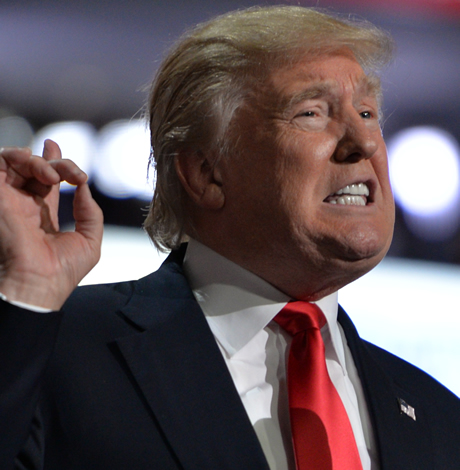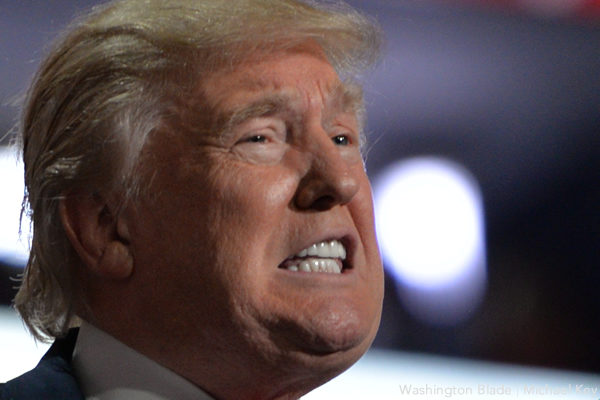News
Trump defends trans military ban: ‘They take massive amounts of drugs’
President fears enlistment for obtaining gender reassignment surgery


In the aftermath of his tweet wishing LGBT Americans a happy Pride, President Trump defended his transgender military ban, asserting the policy is necessary because “they take massive amounts of drugs.”
Trump made the comments Wednesday during his trip to the United Kingdom in an interview with Piers Morgan on “Good Morning Britain,” who asked him about the anti-trans policy.
Initially, Morgan framed the question to Trump in terms of justifying his Pride tweet and his support for his administration global initiative to decriminalize homosexuality. Trump referred to anti-gay criminalization laws as “terrible.”
But then Morgan asked Trump how he could justify banning transgender people from the military if he wants to support LGBT people across the globe.
“Because they take massive amounts of drugs,” Trump said. “They have to, and also, and you’re not allowed to take any drugs. You know, in the military, you’re not allowed to take any drugs. You take an aspirin, and they have to after the operation. They have to. They have no choice. They have to. You would actually have to break rules and regulations in order to have that.”
The Trump administration implemented the transgender military ban in April after the U.S. Supreme Court essentially green lighted the policy as litigation against it proceeds in court.
As Morgan noted, the cost of transition-related care for transgender people in the military is “minuscule.” According to Pentagon data, the Defense Department spent nearly $8 million to treat more than 1,500 transgender troops since 2016, when openly transgender people was first implemented during the Obama administration.
Morgan pointed out the cost of drugs to treat erectile dysfunction under the military health care system was higher than the estimated cost of transition-related care. Trump said he “didn’t know” that was the case.
Asked again by Morgan if the transgender policy was contrary to protecting LGBT human rights around the world, Trump said, “It what it is.”
“Look, massive amounts — and people are going in, then asking for the operation,” Trump said. “The operation is 200,000, 250,000 dollars, and getting the operation, the recovery period is long, and they have to take large amounts of drugs after that, for whatever reason, but large amounts. And that’s not the way it is. I mean, you can’t do that.”
Trump concluded transgender people getting into the military to have gender reassignment surgery and the cost of transition-related care were the reasons he banned them from the armed forces.
“So, I said, yeah, when it came time to making a decision on that and because of the drugs and also because of the cost of the operation,” Trump said.
When Morgan pointed out transgender people are serving in the military with distinction, Trump said he has no beef with them.
“Well, I’m proud of them,” Trump said. “I’m proud of them. I think it’s great, but you have to have a standard, and you have to stick by that standard. We have a great military, and I want to keep it that way. Maybe they’d be phenomenal. I think they probably would be, but you have very strict rules and regulations on drugs and prescription drugs and all of these different things. They blow it all out of the water.”
Aaron Belkin, director of the San Francisco-based Palm Center, said in a statement Trump’s comments were totally without merit because he “repeated the debunked canards that medical care for transgender service members is unmanageably expensive.”
“This morning’s interview should send chills down the spine of every American who believes our military deserves the highest level of informed decision making from its leaders, not prejudice masked as policy,” Belkin said.
Rep. Adam Smith (D-Wash.), chair of the House Armed Services Committee, said in a statement “should stick to the facts” on transgender service.
“Transgender service members meet the same physical and medical standards as their cisgender counterparts,” Smith said. “As members of the one percent of the population willing to serve our nation, they deserve praise for their sacrifice, not judgement and discrimination.”
Kansas
ACLU sues Kansas over law invalidating trans residents’ IDs
A new Kansas bill requires transgender residents to have their driver’s licenses reflect their sex assigned at birth, invalidating current licenses.

Transgender people across Kansas received letters in the mail on Wednesday demanding the immediate surrender of their driver’s licenses following passage of one of the harshest transgender bathroom bans in the nation. Now the American Civil Liberties Union is filing a lawsuit to block the ban and protect transgender residents from what advocates describe as “sweeping” and “punitive” consequences.
Independent journalist Erin Reed broke the story Wednesday after lawmakers approved House Substitute for Senate Bill 244. In her reporting, Reed included a photo of the letter sent to transgender Kansans, requiring them to obtain a driver’s license that reflects their sex assigned at birth rather than the gender with which they identify.
According to the reporting, transgender Kansans must surrender their driver’s licenses and that their current credentials — regardless of expiration date — will be considered invalid upon the law’s publication. The move effectively nullifies previously issued identification documents, creating immediate uncertainty for those impacted.
House Substitute for Senate Bill 244 also stipulates that any transgender person caught driving without a valid license could face a class B misdemeanor, punishable by up to six months in jail and a $1,000 fine. That potential penalty adds a criminal dimension to what began as an administrative action. It also compounds the legal risks for transgender Kansans, as the state already requires county jails to house inmates according to sex assigned at birth — a policy that advocates say can place transgender detainees at heightened risk.
Beyond identification issues, SB 244 not only bans transgender people from using restrooms that match their gender identity in government buildings — including libraries, courthouses, state parks, hospitals, and interstate rest stops — with the possibility for criminal penalties, but also allows for what critics have described as a “bathroom bounty hunter” provision. The measure permits anyone who encounters a transgender person in a restroom — including potentially in private businesses — to sue them for large sums of money, dramatically expanding the scope of enforcement beyond government authorities.
The lawsuit challenging SB 244 was filed today in the District Court of Douglas County on behalf of anonymous plaintiffs Daniel Doe and Matthew Moe by the American Civil Liberties Union, the ACLU of Kansas, and Ballard Spahr LLP. The complaint argues that SB 244 violates the Kansas Constitution’s protections for personal autonomy, privacy, equality under the law, due process, and freedom of speech.
Additionally, the American Civil Liberties Union filed a temporary restraining order on behalf of the anonymous plaintiffs, arguing that the order — followed by a temporary injunction — is necessary to prevent the “irreparable harm” that would result from SB 244.
State Rep. Abi Boatman, a Wichita Democrat and the only transgender member of the Kansas Legislature, told the Kansas City Star on Wednesday that “persecution is the point.”
“This legislation is a direct attack on the dignity and humanity of transgender Kansans,” said Monica Bennett, legal director of the ACLU of Kansas. “It undermines our state’s strong constitutional protections against government overreach and persecution.”
“SB 244 is a cruel and craven threat to public safety all in the name of fostering fear, division, and paranoia,” said Harper Seldin, senior staff attorney for the ACLU’s LGBTQ & HIV Rights Project. “The invalidation of state-issued IDs threatens to out transgender people against their will every time they apply for a job, rent an apartment, or interact with police. Taken as a whole, SB 244 is a transparent attempt to deny transgender people autonomy over their own identities and push them out of public life altogether.”
“SB 244 presents a state-sanctioned attack on transgender people aimed at silencing, dehumanizing, and alienating Kansans whose gender identity does not conform to the state legislature’s preferences,” said Heather St. Clair, a Ballard Spahr litigator working on the case. “Ballard Spahr is committed to standing with the ACLU and the plaintiffs in fighting on behalf of transgender Kansans for a remedy against the injustices presented by SB 244, and is dedicated to protecting the constitutional rights jeopardized by this new law.”
National
After layoffs at Advocate, parent company acquires ‘Them’ from Conde Nast
Top editorial staff let go last week

Former staff members at the Advocate and Out magazines revealed that parent company Equalpride laid off a number of employees late last week.
Those let go included Advocate editor-in-chief Alex Cooper, Pride.com editor-in-chief Rachel Shatto, brand partnerships manager Erin Manley, community editor Marie-Adélina de la Ferriére, and Out magazine staff writers Moises Mendez and Bernardo Sim, according to a report in Hollywood Reporter.
Cooper, who joined the company in 2021, posted to social media that, “Few people have had the privilege of leading this legendary LGBTQ+ news outlet, and I’m deeply honored to have been one of them. To my team: thank you for the last four years. You’ve been the best. For those also affected today, please let me know how I can support you.”
The Advocate’s PR firm when reached by the Blade said it no longer represents the company. Emails to the Advocate went unanswered.
Equalpride on Friday announced it acquired “Them,” a digital LGBTQ outlet founded in 2017 by Conde Nast.
“Equalpride exists to elevate, celebrate and protect LGBTQ+ storytelling at scale,” Equalpride CEO Mark Berryhill said according to Hollywood Reporter. “By combining the strengths of our brands with this respected digital platform, we’re creating a unified ecosystem that delivers even more impact for our audiences, advertisers, and community partners.”
It’s not clear if “Them” staff would take over editorial responsibilities for the Advocate and Out.

In an official statement released at the reveal event Capital Pride Alliance described its just announced 2026 Pride theme of “Exist, Resist, Have the Audacity” as a “bold declaration affirming the presence, resilience, and courage of LGBTQ+ people around the world.”
The statement adds, “Grounded in the undeniable truth that our existence is not up for debate, this year’s theme calls on the community to live loudly and proudly, stand firm against injustice and erasure, and embody the collective strength that has always defined the LGBTQ+ community.”
In a reference to the impact of the hostile political climate, the statement says, “In a time when LGBTQ+ rights and history continue to face challenges, especially in our Nation’s Capital, where policy and public discourse shape the future of our country, together, we must ensure that our voices are visible, heard, and unapologetically centered.”
The statement also quotes Capital Pride Alliance CEO and President Ryan Bos’s message at the Reveal event: “This year’s theme is both a declaration and a demand,” Bos said. “Exist, Resist, Have Audacity! reflects the resilience of our community and our responsibility to protect the progress we’ve made. As we look toward our nation’s 250th anniversary, we affirm that LGBTQ+ people have always been and always will be part of the United States’s history, and we will continue shaping its future with strength and resolve,” he concluded.
-

 Mexico5 days ago
Mexico5 days agoUS Embassy in Mexico issues shelter in place order for Puerto Vallarta
-

 Netherlands4 days ago
Netherlands4 days agoRob Jetten becomes first gay Dutch prime minister
-

 Sports4 days ago
Sports4 days agoMore than a dozen LGBTQ athletes medal at Olympics
-

 Books3 days ago
Books3 days agoNew book profiles LGBTQ Ukrainians, documents war experiences













